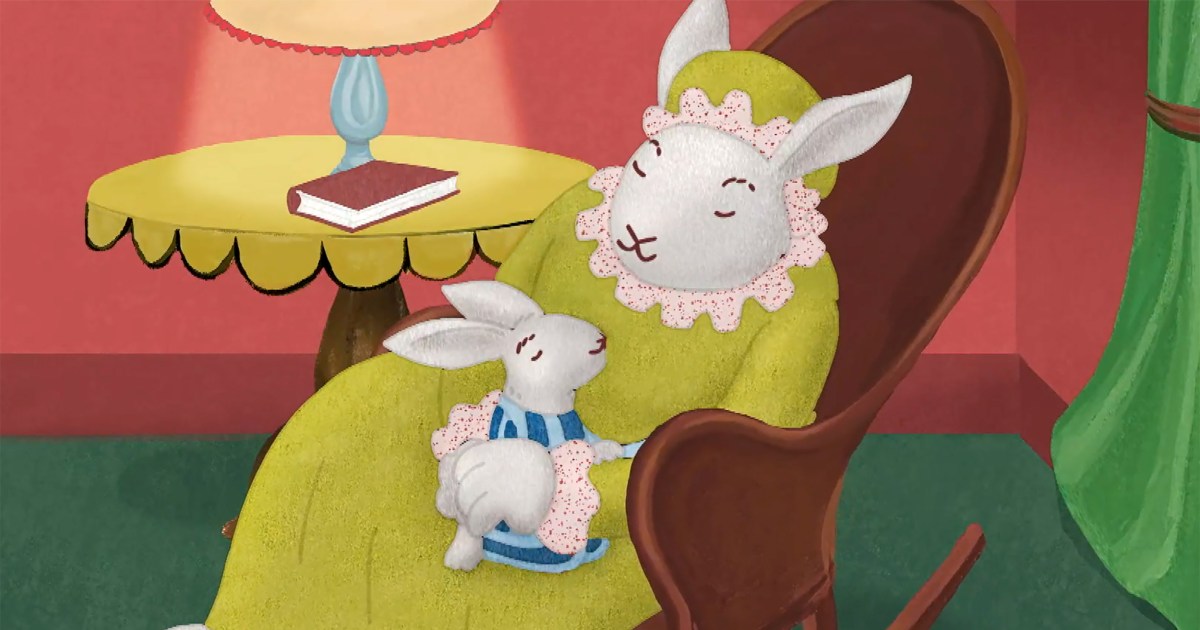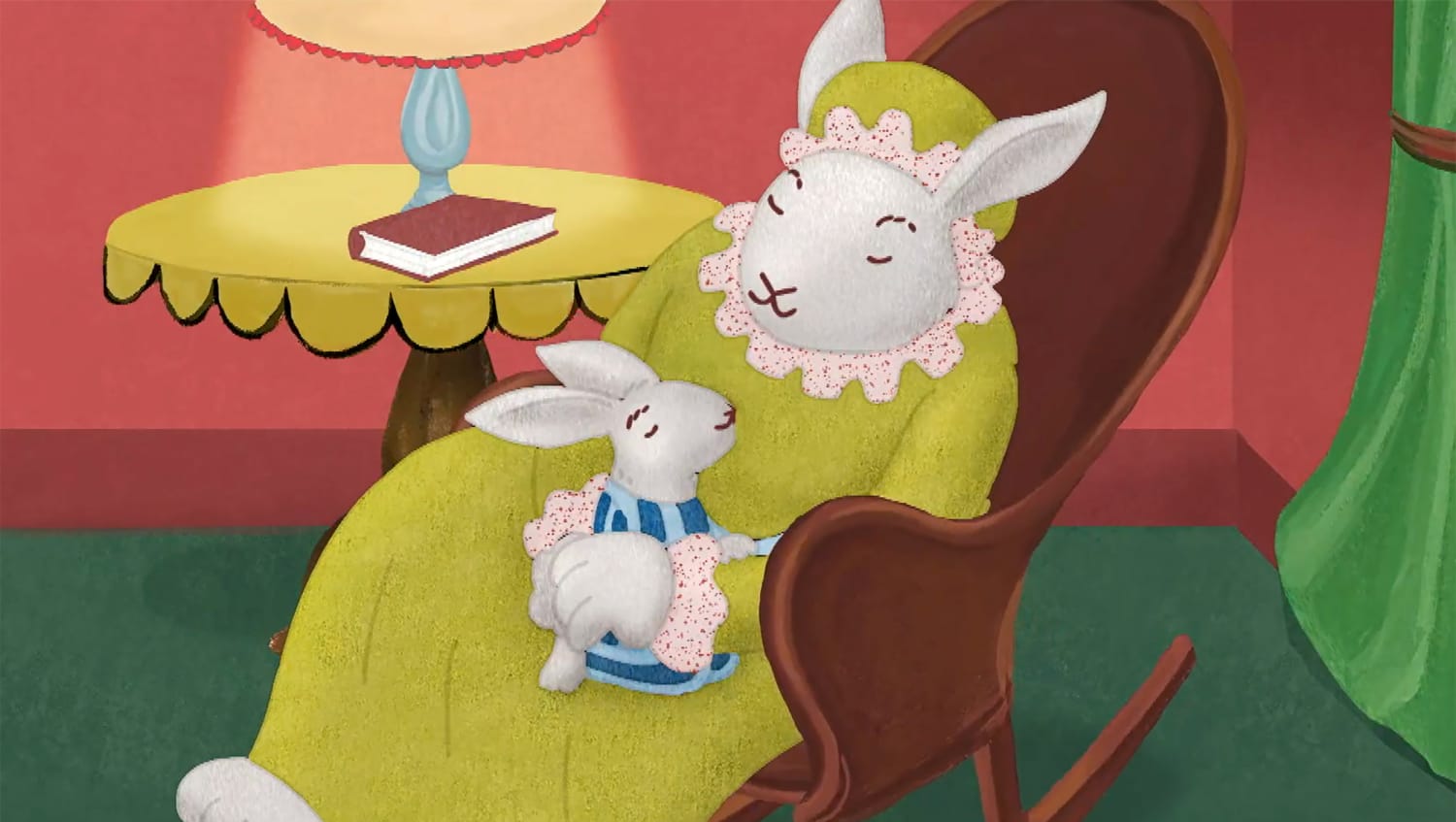
“The Runaway Bunny,” written by Margaret Wise Brown with illustrations by Clement Hurd, was published during a period of intense upheaval both in the lives of its authors and in the world. So perhaps it makes a certain kind of sense that the HBO Max adaptation of it, directed by Amy Schatz and narrated by Tracee Ellis Ross, begins streaming Thursday.
“The Runaway Bunny” is an odd, almost elegiac little picture book, but it’s among the extremely simple texts that my son demands to hear read and re-read, day after day, because they seem to understand him. The mommy bunny in Brown’s story is a relentless pursuer, agreeing to chase her kid in each of his games.
Brown borrowed her narration from a Provençal love ballad, according to Leonard S. Marcus in his biography of her, but instead of a lover pursuing a beloved, it’s a mommy chasing a son who’s testing the boundaries of affection and discipline. “If you pursue me I shall become a fish in the water/ And I shall escape you,” teases the poem’s beloved. “If you become a fish I shall become an eel/ If you become an eel,” the lover responds.
For any kid (and their parent), this is pretty familiar: There’s his world and there’s my world, and while he eats and sleeps in my world, he plays in his own world. There, he can be anything and I can only hope I’m invited to follow. For instance, while we were watching “The Runaway Bunny” together, I asked him to repeat something he’d said very quietly while leaning in close to the screen of my laptop. “Ugh,” he said. “I’m talking to myself,” and there the conversation ended.
At some point, as Brown and Hurd suggest in their book, parents become strangers in their kids’ world in the same way they’ve been strangers in ours.
Things like that have happened a lot recently. I’ll hear him talking to his cars, and maybe he’ll bookend a satisfying interaction by saying “Chapter three.” But when I ask him what’s up, and he’ll look at me like I’ve interrupted a church service and explain impatiently, “You’re not in this movie.”
At some point, as Brown and Hurd suggest in their book, we become strangers in their world in the same way they’ve been strangers in ours. We can play when we’re asked and listen when it’s demanded and then chase them in the fashion warranted by the occasion when they run away.
I was worried this emotional awareness wouldn’t necessarily translate to the screen, mostly because I’ve seen a lot of what else is out there. The streaming boomlet has put pretty much every famous children’s book on our laptop and TV screens: Amazon has acquired two Canadian shows based on Richard Scarry’s “Busytown” books, and Netflix has a “Go, Dog. Go!” cartoon based loosely on the P.D. Eastman book set in an all-dog town called Pawston. Most of them are fine; I do appreciate the shows that try to teach spatial reasoning and critical thinking and other important skills.
But, in the end, I was pleasantly surprised by how abstract and eccentric “The Runaway Bunny” was in its adherence to the structure of a picture book. It’s a surprisingly faithful and beautiful adaptation of Brown and Hurd’s story, with stylistic flourishes by animator Maciek Albrecht that first recall the book’s black-and-white conversations between the mother rabbit and her son and then the colorful two-page spreads illustrating his daydreams (with musical numbers for each one).
Children, especially very small ones, are still feeling out what we adults think of as the most basic aspects of the world.
The songs are a little emotionally intense for me, and I kept looking over at my kid to see if he was enjoying it. He was, even when Rufus Wainwright sang Billy Joel’s “Lullabye (Goodnight, My Angel),” a saccharine, sad song. And I remembered being sad as a little kid and not really knowing what to do about it, since nobody ever really wanted to know why you were sad or what you were sad about, just how to cheer you up.
Children, especially very small ones, are still feeling out what we adults think of as the most basic aspects of the world, testing them and savoring them and trying to see whether big unknowable things — like Covid-19 (which my 4-year-old now asks about by name) and grandma’s cat (who we loved, but is dead now) and not getting to see anybody last Christmas — can be addressed during a game of dirt volcanos and yellow cement mixers. It’s an article of faith among adults that they can’t, but I’m not so sure these days. Kids play about what’s on their minds.
So, too, do adults. “I will become a little sailboat, and I will sail away from you,” threatens the little rabbit at one point in Brown’s book. “If you become a sailboat and sail away from me,” his mother replies, “I will become the wind and blow you where I want you to go.”
Hurd, previously a staunch pacifist, had become so convinced of the menace posed by the Nazis that he’d enlisted in the Army in early 1942, according to Marcus, Brown’s biographer. On Nov. 1, just a few months after drawing the mommy bunny wind blowing the baby bunny’s sail-ears, Hurd shipped out for the Pacific theater. To what extent is this book about the fears that must surely have obsessed its authors? To what extent is my child playing with his trucks about death?
When the HBO adaptation of “The Runaway Bunny” ended, my 4-year-old turned to me and said, “Is there more movies of that?” No, I told him, that’s the only one. “No,” he said, “I mean, like in ‘Batman.’” Unfortunately, in his opinion, “The Runaway Bunny” is not a franchise, but a one-off special. Perhaps, then, like the book, we’ll have to watch and re-watch, or perhaps it will inspire a few more adaptations that speak to kids’ abilities to play with complex emotions, even if they don’t quite understand what they all mean yet.
In the meantime, I’ll continue to watch him play and worry about how the events of the last four years have affected him and join him when invited so he can explain how he thinks the world works to me. There are things he can’t know about the black-and-white adult world he’ll inherit, but there are ways he is already adding color to it that I never could have anticipated.
Source: | This article originally belongs to Nbcnews.com










